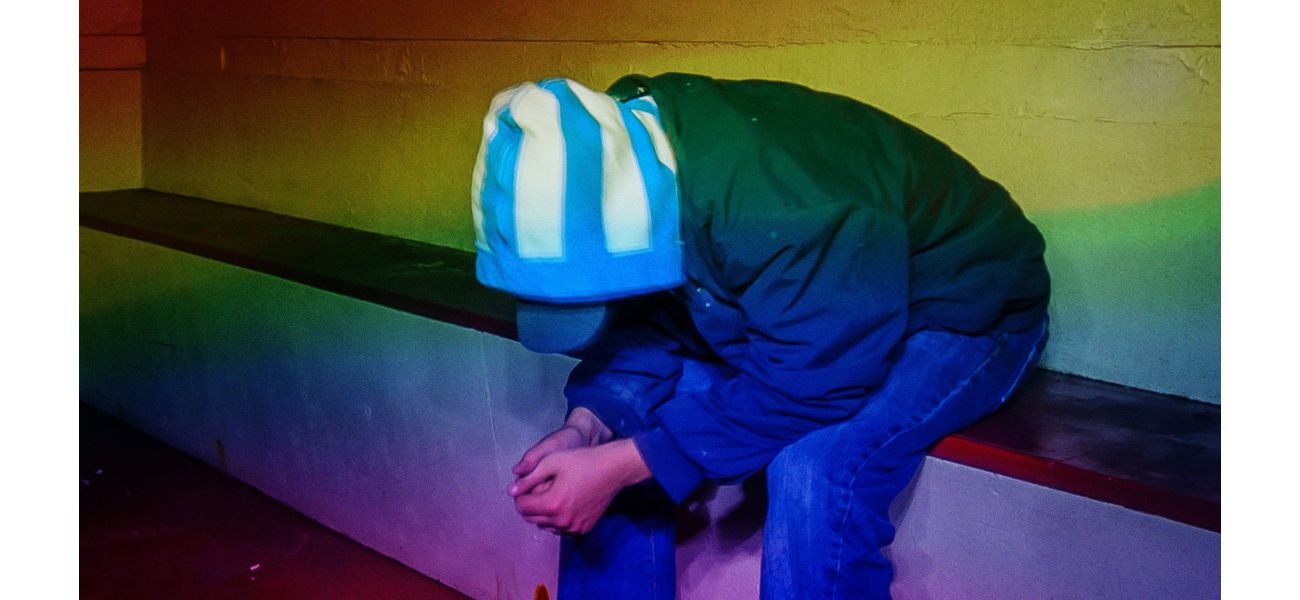Immigrants in detention centers face abuse and discrimination due to their LGBTQ+ identity, including being physically attacked.
The number of LGBTQ+ individuals in immigration detention in 2023 was twice as high as the previous year.
October 25th 2024.

Immigration detention is a harsh reality for many LGBTQ+ individuals, who face unique challenges and discrimination within these facilities. Joel Mordi, a 26-year-old gay man from Nigeria, vividly recalls his experience upon arriving at Harmondsworth Immigration Removal Centre. As he was guided through the facility, he immediately felt powerless as homophobic insults were hurled at him by fellow detainees. Despite wearing a blazer and Doc Martens with rainbow laces, he was targeted and called derogatory names like "sissy," "f****t," and "batty boy." Joel describes the experience as feeling like he had a "target on his back," yet the officer with him did nothing to intervene.
Joel's journey to the UK began on November 5, 2019, when he fled Nigeria after receiving death threats for organizing a protest for LGBTQ+ rights. But his ordeal was far from over. Upon arriving at Heathrow Airport and claiming asylum, he was held in a waiting room for 11 hours and then transferred to Harmondsworth IRC. There, he spent one night in the facility's annex before being moved to the main detention area where the homophobic insults and abuse continued.
One night, an unknown detainee entered Joel's room and demanded sexual favors, threatening to harm him if he refused. Terrified, Joel complied, but the following night, when the same person returned, Joel screamed and the man left. Despite trying to report the incidents to a detention center officer, Joel was dismissed and not taken seriously. The traumatic experience left him shaken and afraid for his life.
Even though Joel was granted bail less than a week after being detained, the damage was already done. He suffered from insomnia, nightmares, flashbacks, and PTSD in the years that followed. Joel explains that "detention never really leaves you," and the memories of his time there are forever etched in his mind.
The Home Office's decision to clear the backlog of "legacy" asylum claims has led to an increase in the number of people held in immigration detention, including LGBTQ+ individuals. According to Rainbow Migration, an immigration charity, there were at least 259 LGBTQ+ people detained in 2023 - double the amount from the previous year. However, due to limited data collection by the Home Office and the reluctance of LGBTQ+ individuals to out themselves to detention center staff, the actual number is likely much higher.
In 2017, a BBC Panorama investigation into Brook House Immigration Removal Centre near Gatwick Airport exposed instances of abuse and mistreatment towards detainees. This led to an independent inquiry, known as the Brook House Inquiry, which revealed the mistreatment of a gay Moroccan man, referred to as D1538. The report found that the man did not feel safe in detention and was subjected to degrading treatment by a detention custody officer. The government has since responded to the report, stating that the behavior of contracted service provider staff was "shocking and unacceptable."
Unfortunately, this is just the tip of the iceberg when it comes to the experiences of LGBTQ+ individuals in immigration detention. Nisha, a 44-year-old transgender woman from India, came to the UK in 2007 to further her education and explore her gender identity. However, in 2014, she was arrested for breaching her visa's employment conditions. Nisha's story is just one of many that highlight the discrimination and mistreatment faced by LGBTQ+ individuals in detention. It is a harsh reality that must be addressed and changed.
The experience of LGBTQ+ people in immigration detention is a unique and difficult one. When Joel Mordi arrived at the Harmondsworth Immigration Removal Centre, he immediately felt like he had entered the gates of hell. Despite his fashionable outfit, consisting of a blazer and Doc Martens with rainbow laces, the atmosphere was tense and unwelcoming. As he was guided through the facility, he couldn't help but notice the yellow doors and groups of people huddled together. But unfortunately, the worst was yet to come.
As a 26-year-old gay man from Nigeria, Joel was already familiar with the discrimination and violence faced by the LGBTQ+ community in his home country. That's why he chose to flee after receiving death threats for organizing a protest for LGBTQ+ rights. But his journey to safety was far from over. Upon his arrival at Heathrow Airport, he immediately claimed asylum and was held in a waiting room for 11 hours before being transferred to Harmondsworth IRC.
Joel's first night in the facility's annex was already a nightmare, but things only got worse when he was moved to the main detention area. He was subjected to homophobic insults and threats from fellow detainees, leaving him feeling powerless and vulnerable. And as if that wasn't enough, he also experienced sexual assault from another detainee. Despite his attempts to report the incident, he was dismissed by an officer who didn't want to hear his story.
The trauma and fear that Joel experienced during his time in detention still haunt him, even five years later. His mental health has suffered greatly, and he struggles with insomnia, nightmares, and PTSD. The damage done during his brief stay in detention has had a lasting impact on his life.
Unfortunately, Joel's story is not unique. In fact, the number of LGBTQ+ people in immigration detention has been on the rise, with exclusive figures from Rainbow Migration showing a significant increase since 2022. And these numbers may not even reflect the true extent of the issue, as the Home Office does not systematically collect data on LGBTQ+ people in detention.
In 2017, the mistreatment and abuse of detainees at Brook House IRC was exposed by an undercover investigation. This led to an independent inquiry, which revealed the shocking treatment of a gay man from Morocco, who did not feel safe in detention due to his sexuality. The inquiry also uncovered serious failings in the investigation of his complaints, highlighting the need for change within the system.
The UK government has responded to these findings, acknowledging the unacceptable behavior of contracted service provider staff and implementing diversity training for detention custody officers. However, the experience of LGBTQ+ asylum seekers in detention remains a harrowing one, as shared by several individuals who have spoken to Metro.
One such person is Nisha, a transgender woman from India who fled to the UK in 2007 to escape the discrimination and violence faced by trans people in her home country. Despite feeling safer in the UK, she was arrested in 2014 and detained in Brook House IRC for breaching her visa conditions. This experience only added to the already difficult journey she had taken to find acceptance and safety.
The stories of Joel and Nisha are just the tip of the iceberg when it comes to the experiences of LGBTQ+ asylum seekers in immigration detention. The system is in dire need of change, as these individuals are already fleeing persecution and discrimination in their home countries, only to face further mistreatment and trauma in the UK. It's time for our government to take action and ensure the safety and well-being of all individuals, regardless of their sexual orientation or gender identity.
Joel's journey to the UK began on November 5, 2019, when he fled Nigeria after receiving death threats for organizing a protest for LGBTQ+ rights. But his ordeal was far from over. Upon arriving at Heathrow Airport and claiming asylum, he was held in a waiting room for 11 hours and then transferred to Harmondsworth IRC. There, he spent one night in the facility's annex before being moved to the main detention area where the homophobic insults and abuse continued.
One night, an unknown detainee entered Joel's room and demanded sexual favors, threatening to harm him if he refused. Terrified, Joel complied, but the following night, when the same person returned, Joel screamed and the man left. Despite trying to report the incidents to a detention center officer, Joel was dismissed and not taken seriously. The traumatic experience left him shaken and afraid for his life.
Even though Joel was granted bail less than a week after being detained, the damage was already done. He suffered from insomnia, nightmares, flashbacks, and PTSD in the years that followed. Joel explains that "detention never really leaves you," and the memories of his time there are forever etched in his mind.
The Home Office's decision to clear the backlog of "legacy" asylum claims has led to an increase in the number of people held in immigration detention, including LGBTQ+ individuals. According to Rainbow Migration, an immigration charity, there were at least 259 LGBTQ+ people detained in 2023 - double the amount from the previous year. However, due to limited data collection by the Home Office and the reluctance of LGBTQ+ individuals to out themselves to detention center staff, the actual number is likely much higher.
In 2017, a BBC Panorama investigation into Brook House Immigration Removal Centre near Gatwick Airport exposed instances of abuse and mistreatment towards detainees. This led to an independent inquiry, known as the Brook House Inquiry, which revealed the mistreatment of a gay Moroccan man, referred to as D1538. The report found that the man did not feel safe in detention and was subjected to degrading treatment by a detention custody officer. The government has since responded to the report, stating that the behavior of contracted service provider staff was "shocking and unacceptable."
Unfortunately, this is just the tip of the iceberg when it comes to the experiences of LGBTQ+ individuals in immigration detention. Nisha, a 44-year-old transgender woman from India, came to the UK in 2007 to further her education and explore her gender identity. However, in 2014, she was arrested for breaching her visa's employment conditions. Nisha's story is just one of many that highlight the discrimination and mistreatment faced by LGBTQ+ individuals in detention. It is a harsh reality that must be addressed and changed.
The experience of LGBTQ+ people in immigration detention is a unique and difficult one. When Joel Mordi arrived at the Harmondsworth Immigration Removal Centre, he immediately felt like he had entered the gates of hell. Despite his fashionable outfit, consisting of a blazer and Doc Martens with rainbow laces, the atmosphere was tense and unwelcoming. As he was guided through the facility, he couldn't help but notice the yellow doors and groups of people huddled together. But unfortunately, the worst was yet to come.
As a 26-year-old gay man from Nigeria, Joel was already familiar with the discrimination and violence faced by the LGBTQ+ community in his home country. That's why he chose to flee after receiving death threats for organizing a protest for LGBTQ+ rights. But his journey to safety was far from over. Upon his arrival at Heathrow Airport, he immediately claimed asylum and was held in a waiting room for 11 hours before being transferred to Harmondsworth IRC.
Joel's first night in the facility's annex was already a nightmare, but things only got worse when he was moved to the main detention area. He was subjected to homophobic insults and threats from fellow detainees, leaving him feeling powerless and vulnerable. And as if that wasn't enough, he also experienced sexual assault from another detainee. Despite his attempts to report the incident, he was dismissed by an officer who didn't want to hear his story.
The trauma and fear that Joel experienced during his time in detention still haunt him, even five years later. His mental health has suffered greatly, and he struggles with insomnia, nightmares, and PTSD. The damage done during his brief stay in detention has had a lasting impact on his life.
Unfortunately, Joel's story is not unique. In fact, the number of LGBTQ+ people in immigration detention has been on the rise, with exclusive figures from Rainbow Migration showing a significant increase since 2022. And these numbers may not even reflect the true extent of the issue, as the Home Office does not systematically collect data on LGBTQ+ people in detention.
In 2017, the mistreatment and abuse of detainees at Brook House IRC was exposed by an undercover investigation. This led to an independent inquiry, which revealed the shocking treatment of a gay man from Morocco, who did not feel safe in detention due to his sexuality. The inquiry also uncovered serious failings in the investigation of his complaints, highlighting the need for change within the system.
The UK government has responded to these findings, acknowledging the unacceptable behavior of contracted service provider staff and implementing diversity training for detention custody officers. However, the experience of LGBTQ+ asylum seekers in detention remains a harrowing one, as shared by several individuals who have spoken to Metro.
One such person is Nisha, a transgender woman from India who fled to the UK in 2007 to escape the discrimination and violence faced by trans people in her home country. Despite feeling safer in the UK, she was arrested in 2014 and detained in Brook House IRC for breaching her visa conditions. This experience only added to the already difficult journey she had taken to find acceptance and safety.
The stories of Joel and Nisha are just the tip of the iceberg when it comes to the experiences of LGBTQ+ asylum seekers in immigration detention. The system is in dire need of change, as these individuals are already fleeing persecution and discrimination in their home countries, only to face further mistreatment and trauma in the UK. It's time for our government to take action and ensure the safety and well-being of all individuals, regardless of their sexual orientation or gender identity.
[This article has been trending online recently and has been generated with AI. Your feed is customized.]
[Generative AI is experimental.]
0
0
Submit Comment





